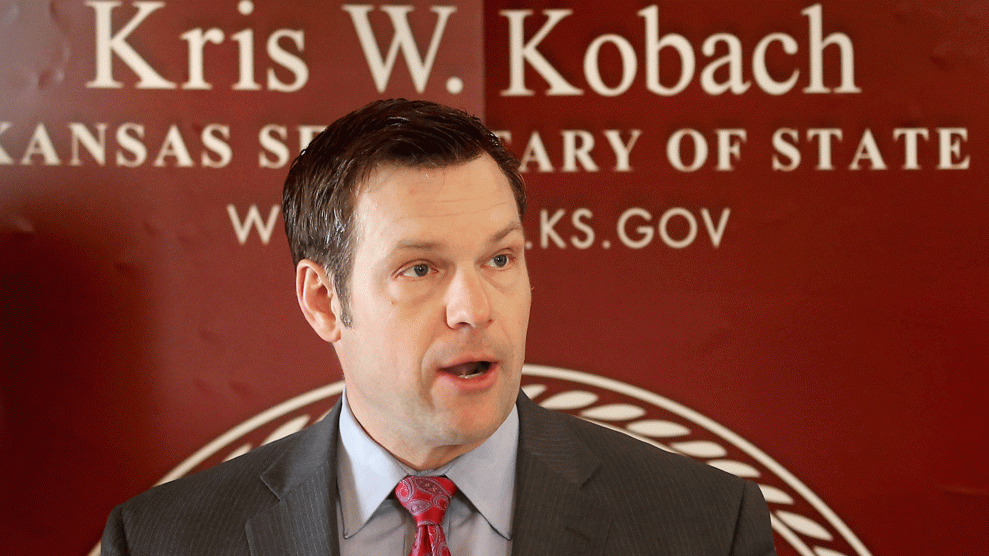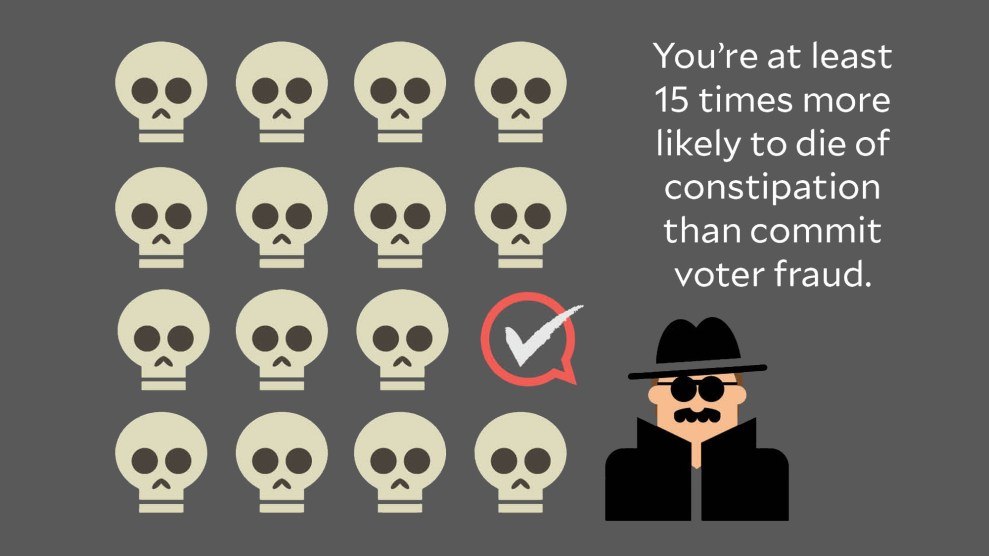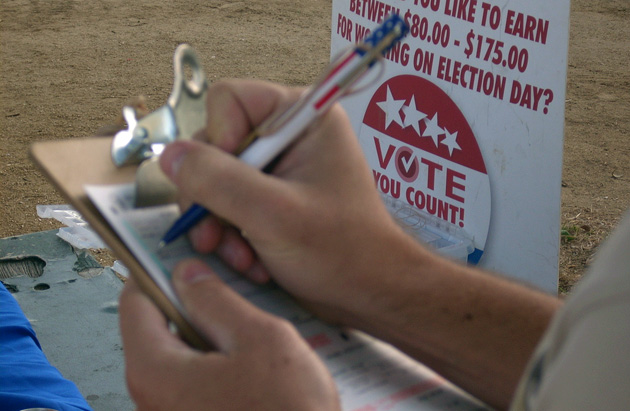
Kansas Secretary of State and Trump immigration advisor Kris KobachThad Allton/The Topeka Capital-Journal via AP
Late last week, the DC Circuit Court of Appeals issued an injunction blocking attempts by Kansas, Alabama, and Georgia to require proof of citizenship to register to vote for the upcoming election. The order was the latest in a long-running battle between those who demand strict and often onerous requirements to casting a ballot in order to combat voter fraud, and those who consider these measures as nothing more than thinly veiled attempts to suppress minority voting.
The Supreme Court ruled three years ago that Arizona could not require proof of citizenship from people registering to vote using a federal registration form. But that didn’t stop anti-immigrant groups and conservative states from continuing to try. And those efforts, which resulted in the federal lawsuit that prompted last week’s injunction, have already created havoc and may have disenfranchised tens of thousands of voters in the run-up to the hotly contested presidential election this year.
Lloyd Leonard, the senior director for advocacy for the League of Women Voters, one of the plaintiffs in the case, says the stakes are high. He considers the number of citizens disenfranchised because they failed to produce citizenship documents, as they already have been in Kansas, potentially “outcome determinative” in an election. A loss would likely result in “a state-by-state fight in the battle over voter suppression,” which “we’re trying to nip that in the bud,” he says.
The lawsuit, League of Women Voters v. Newby, features a cast of characters who’ve been behind some of the nation’s most aggressive state anti-immigration legislation as well as restrictive voter ID laws. The litigation reveals how, despite multiple legal setbacks, they’ve found creative new targets and avenues to continue their fight for voting restrictions that could affect elections across the country. One of the leaders in that fight is Kansas Secretary of State Kris Kobach, who has been on the front lines of the country’s anti-immigration battles for the past decade, and he has said he is an immigration adviser to GOP presidential nominee Donald Trump.
Kobach did not respond to a request for comment after Friday’s court decision, but he told the conservative Heritage Foundation’s Daily Signal that “there is a huge potential for aliens’ votes to swing a close election. Even if it’s just a handful of votes, it’s still a huge injustice. Every time an alien votes, it effectively cancels out a vote of a U.S. citizen.”
The lawsuit involves an obscure federal agency called the Election Assistance Commission (EAC). In the wake of the controversial presidential election in 2000, Congress created the agency in 2002 as part of the Help America Vote Act, a law specifically designed to make voting easier. With two Republican and two Democratic commissioners, nominated by the president and confirmed by the Senate, the commission has authority over the federal mail-in voter registration form. In January this year, the executive director of the EAC signed off on a request from Kobach to change that form used in Kansas to require proof of citizenship.
Kobach is no ordinary government official, and this was no ordinary request. The Harvard-Yale-Oxford lawyer has drafted some of the most extreme state anti-immigrant legislation, including the Arizona law the Supreme Court shot down in 2013, and he’s advised some of the nation’s most prominent nativists. Even though he was one of the losers in the 2013 Supreme Court case from Arizona, Kobach saw a road map to victory in the decision. In his majority opinion, Justice Antonin Scalia suggested that even though Arizona had violated the law by asking for citizenship papers without approval from the EAC, the agency had the power to authorize the state to add such a requirement to the federal registration form. Since 2006, several states, led by Arizona, have repeatedly and unsuccessfully asked the commission just that. After the 2013 Supreme Court decision, Kobach again asked the commission to allow Kansas to require citizenship papers to register to vote, arguing that it was essential to prevent voter fraud by “aliens.”
Again, in 2014, the commission said no, declaring that the states had presented virtually no evidence of the sort of voter fraud that would justify such a move. Kobach sued the commission, lost in the 10th Circuit Court of Appeals, and the Supreme Court rejected his appeal. But like all good lawyers, Kobach found another opening: the disarray at the EAC.
The agency had gone many years without the requisite three members needed to make an official decision. (In a dissent in the 2013 Arizona case, Justice Samuel Alito quipped, “The EAC currently has no members, and there is no reason to believe that it will be restored to life in the near future.”) But in 2014, the Senate finally confirmed three commissioners, two Republicans and a Democrat—enough for a quorum.
In November 2015, the commissioners appointed Brian Newby as the EAC’s new executive director. Newby just happened to work for Kobach as a county election commissioner in Kansas. His former boss had lobbied the GOP members of the commission to hire his protegé—even as Kobach’s own office was investigating problems with Newby’s job performance. (Newby said that because of the ongoing litigation, he was unable to answer questions for this story.) In March this year, a state audit alleged that Newby had wasted state money, improperly purchasing goodies like Google glasses, taking limos to the airport even though he had a $300 monthly car allowance, and misusing government credit cards.
Emails obtained by the Associated Press showed that Newby was especially grateful for Kobach’s help getting the EAC job, for which he was saying “repeated prayers of thanksgiving.” Newby’s gratitude seemed to extend beyond prayers. According to the AP, Newby gushed in an email to Kobach that “I wanted you in the loop, in part because of other issues in the past with the EAC. I also don’t want you thinking that you can’t count on me in an upcoming period that will tax our resources.”
It didn’t take long for these assurances to become action. Just two months after taking the EAC job, Newby approved Kobach’s fifth request to allow Kansas to require proof of citizenship on its federal voter registration form. He also unilaterally granted similar requests from Alabama and Georgia that had been made roughly two and three years earlier—even though the EAC had previously denied the one from Georgia—without a vote from the commissioners.
Voting rights advocates, including the League of Women Voters and the American Civil Liberties Union, filed suit against Newby and the EAC in February, asking a DC federal judge to immediately block the change in the registration forms before the upcoming primary elections. US District Court Judge Richard Leon, appointed by President George W. Bush, refused. The hotly ideological legal battle has waged on ever since.
Kobach was not a party to the original suit, but he successfully petitioned the court to allow him to intervene. He argued that the Obama Justice Department was deeply opposed to proof-of-citizenship requirements and couldn’t be relied on to vigorously defend the agency. (He was right; the Department of Justice ultimately refused to defend Newby, arguing that his actions were blatantly illegal.)
Representing Kobach were lawyers from the Immigration Reform Law Institute, an organization well known for its harsh anti-immigration advocacy. The Public Interest Legal Foundation also intervened on Newby’s behalf to advocate “voting integrity.” The foundation is made up of some former members of the George W. Bush administration who helped promote discredited claims of widespread voter fraud as a way of supporting voter suppression legislation in the states. One of the Republican EAC commissioners has also tried to join Kobach’s crusade independently, represented by lawyers from Judicial Watch, the group famous for its litigiousness against the Clinton and Obama administrations.
The lawsuit dragged on for more than six months, leaving the status of thousands of potential voters in limbo even as registration deadlines were fast approaching. Finally, the DC Circuit Court of Appeals overturned Judge Leon’s decision and issued an injunction requiring Kansas, Georgia, and Alabama to immediately remove the proof-of-citizenship language from their registration forms and to allow people who’d already tried to register without the citizenship paperwork to join the voter rolls. Orion Danjuma, a lawyer from the ACLU involved in the case, says, “Both the courts and Congress recognize the right to vote as the cornerstone of our democratic system. One hopes that this latest court loss will prompt Mr. Kobach to move on and just let the people vote. Sadly, I’m not going to hold my breath.”
Many citizens have already been affected. Alabama and Georgia claimed not to be enforcing the citizenship requirement during the litigation, but Kansas has been, even before the EAC authorized it. In a court hearing last week, Kobach said the state has put more than 17,000 people on what they refer to as a “suspense list” for failing to include citizenship proof with their federal registration forms; at times it has had as many as 35,000. Voting rights advocates believe most are citizens eligible to vote. They’re folks like Marvin Brown, who became an EAC plaintiff. He’s a 90-year-old World War II veteran who tried to register to vote in Kansas without proof of citizenship and was turned down.
Harder to quantify is how many eligible people the citizenship language deterred from registering at all. In legal filings, the League of Women Voters described some of the logistical difficulties the requirement has created. A League official in Kansas said in 2014, volunteers spent 32 hours visiting the homes of 115 people on the suspense list, in an outreach that netted only 30 completed voter registrations.
Litigation on the merits of the League’s lawsuit continues before Judge Leon in the trial court, meaning Kobach could still ultimately prevail, just not for this year’s election. Kobach plans to keep up the fight, all the way to the Supreme Court again if necessary. “This [is] about the rule of law,” Kobach told the Signal. “We have law-breaking when it comes to elections, and solving the problem is not difficult.”

















